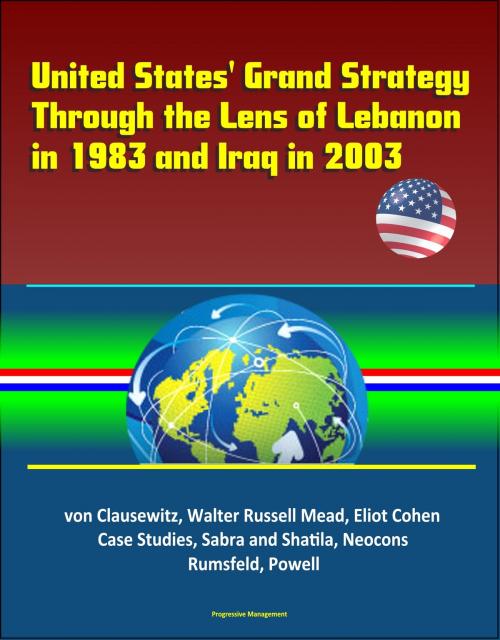United States' Grand Strategy Through the Lens of Lebanon in 1983 and Iraq in 2003: von Clausewitz, Walter Russell Mead, Eliot Cohen, Case Studies, Sabra and Shatila, Neocons, Rumsfeld, Powell
Nonfiction, History, Military, United States| Author: | Progressive Management | ISBN: | 9781311703040 |
| Publisher: | Progressive Management | Publication: | May 30, 2016 |
| Imprint: | Smashwords Edition | Language: | English |
| Author: | Progressive Management |
| ISBN: | 9781311703040 |
| Publisher: | Progressive Management |
| Publication: | May 30, 2016 |
| Imprint: | Smashwords Edition |
| Language: | English |
Professionally converted for accurate flowing-text e-book format reproduction, this unique book examines why America has failed in both Lebanon in 1982-1984 and Iraq in 2003, to achieve its political objectives. While there are many reasons for this, perhaps the greatest is that the government failed to coordinate and direct all of its resources in a unified manner to achieve its goals. This paper outlines four key indicators, present in both Lebanon and Iraq that suggest the United States did not have a grand strategy. Further, this paper reveals that Lebanon and Iraq are not anomalies; there are both historical and structural reasons why the United States struggles to implement grand strategies.
CHAPTER 1 - INTRODUCTION * CHAPTER 2 - GRAND STRATEGY, DOCTRINE, AND DEFINITIONS * Carl von Clausewitz * B. H. Liddell Hart * Modern Theorists * Walter Russell Mead * Eliot Cohen * Dennis Drew and Dr. Donald Snow * Intensity of Interest * Conclusion * CHAPTER 3 - HOW THE GOVERNMENT CREATES GRAND STRATEGY * History of United States Grand Strategy * World War II * Cold War (1945 to 1988) * Post-Cold War (1988 to 2001) * Post 9/11 * The National Security Council * Presidential Decision Directives * Presidential Decision Directive 56: The Clinton Administration's Policy on Managing Complex Contingency Operations * The Reality of Grand Strategy * CHAPTER 4 - LEBANON CASE STUDY * Understanding how the United States Became Involved * Lebanese Civil War * Why the United States' Mission in Lebanon Failed * Military Mission Wholly Dependent on Political Reconciliation * Sabra and Shatila * 17 May Agreement * Disagreement over What Needs to be Done and How to do it * National Security Decision Directive 103 * State Department versus Department of Defense * The National Security Council versus Defense and State * If the Strategy is not Working: "Americanize" it * Military Roles versus Political Objectives: Lack of Congruency * Grand Strategy * CHAPTER 5 - IRAQ CASE STUDY * Understanding how the United States Became Involved * Containment * Iraq Liberation Act * George W. Bush Administration * Phase I Operations * Phase II Operations * Phase III Operations * Phase IV Operations * Why the United States' Mission in Iraq Initially Failed * Military Mission Wholly Dependent on Political Reconciliation * Neoconservatives * Disagreement over What Needs to be Done and How to Do it * Rumsfeld versus Powell * Rumsfeld versus the Military * If the Strategy is not Working: "Americanize" it * Military Roles versus Political Objectives * Grand Strategy * CHAPTER 6 - CONCLUSION
American grand strategy is the collection of plans and policies by which the leadership of the United States mobilizes and deploys the country's resources and capabilities, both military and nonmilitary, to achieve its national goals. Grand strategy exists in the real world of governing whether it is carefully formulated and articulated in advance, or whether it evolves ad hoc out of world views, predilections, and subjectivities of those who govern. It is a fruitful field for scholars and students to study so that those who govern and those who are governed might have the richest conceptual repertoire with which to construct and evaluate national policies.
The relatively short history of United States (U.S.) involvement in the Middle East is full of frustrating setbacks and lost opportunities whose origins can be traced to a lack of grand strategy for the region. Some examples that immediately spring to mind are the closure of the Suez Canal, the oil embargo, the failed peace processes, the Iranian hostage crisis, the Iran-Iraq war, and the rise of Islamic radicals. In each of these examples, the U.S.' inability to formulate a grand strategy, pre-planned or ad hoc, led to the failure of stated political objectives.
Professionally converted for accurate flowing-text e-book format reproduction, this unique book examines why America has failed in both Lebanon in 1982-1984 and Iraq in 2003, to achieve its political objectives. While there are many reasons for this, perhaps the greatest is that the government failed to coordinate and direct all of its resources in a unified manner to achieve its goals. This paper outlines four key indicators, present in both Lebanon and Iraq that suggest the United States did not have a grand strategy. Further, this paper reveals that Lebanon and Iraq are not anomalies; there are both historical and structural reasons why the United States struggles to implement grand strategies.
CHAPTER 1 - INTRODUCTION * CHAPTER 2 - GRAND STRATEGY, DOCTRINE, AND DEFINITIONS * Carl von Clausewitz * B. H. Liddell Hart * Modern Theorists * Walter Russell Mead * Eliot Cohen * Dennis Drew and Dr. Donald Snow * Intensity of Interest * Conclusion * CHAPTER 3 - HOW THE GOVERNMENT CREATES GRAND STRATEGY * History of United States Grand Strategy * World War II * Cold War (1945 to 1988) * Post-Cold War (1988 to 2001) * Post 9/11 * The National Security Council * Presidential Decision Directives * Presidential Decision Directive 56: The Clinton Administration's Policy on Managing Complex Contingency Operations * The Reality of Grand Strategy * CHAPTER 4 - LEBANON CASE STUDY * Understanding how the United States Became Involved * Lebanese Civil War * Why the United States' Mission in Lebanon Failed * Military Mission Wholly Dependent on Political Reconciliation * Sabra and Shatila * 17 May Agreement * Disagreement over What Needs to be Done and How to do it * National Security Decision Directive 103 * State Department versus Department of Defense * The National Security Council versus Defense and State * If the Strategy is not Working: "Americanize" it * Military Roles versus Political Objectives: Lack of Congruency * Grand Strategy * CHAPTER 5 - IRAQ CASE STUDY * Understanding how the United States Became Involved * Containment * Iraq Liberation Act * George W. Bush Administration * Phase I Operations * Phase II Operations * Phase III Operations * Phase IV Operations * Why the United States' Mission in Iraq Initially Failed * Military Mission Wholly Dependent on Political Reconciliation * Neoconservatives * Disagreement over What Needs to be Done and How to Do it * Rumsfeld versus Powell * Rumsfeld versus the Military * If the Strategy is not Working: "Americanize" it * Military Roles versus Political Objectives * Grand Strategy * CHAPTER 6 - CONCLUSION
American grand strategy is the collection of plans and policies by which the leadership of the United States mobilizes and deploys the country's resources and capabilities, both military and nonmilitary, to achieve its national goals. Grand strategy exists in the real world of governing whether it is carefully formulated and articulated in advance, or whether it evolves ad hoc out of world views, predilections, and subjectivities of those who govern. It is a fruitful field for scholars and students to study so that those who govern and those who are governed might have the richest conceptual repertoire with which to construct and evaluate national policies.
The relatively short history of United States (U.S.) involvement in the Middle East is full of frustrating setbacks and lost opportunities whose origins can be traced to a lack of grand strategy for the region. Some examples that immediately spring to mind are the closure of the Suez Canal, the oil embargo, the failed peace processes, the Iranian hostage crisis, the Iran-Iraq war, and the rise of Islamic radicals. In each of these examples, the U.S.' inability to formulate a grand strategy, pre-planned or ad hoc, led to the failure of stated political objectives.















